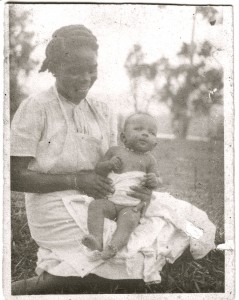
In writing my recent book, Split at the Root: A Memoir of Love and Lost Identity (Kindle) or Split at the Root: A Memoir of Love and Lost Identity, I tell the story of growing up within a culture and a race that was different to my own. Here’s an excerpt:
The night I finished reading Jamaica Kincaid’s Annie John, the wind blowing outside my window ushered messages into my dreams.
I was Annie John, and had just turned three. The Black mother and I stood hand in hand on an elevation next to our Caribbean home. I was wearing the white dress she made for me and felt the warm, jasmine scented breeze blow gently through the gauze, caressing my body. My hair was woven into four braids, as I used to wear it when I was young. I was barefoot and my toenails looked like luminous little shells left on the sand by receding tides. We observed a fisherman in his canoe on the turquoise sea while macaws with bright ruby breasts perched on branches of water-logged trees on the sand below. We walked behind the house, past the laundry drying on the line between bushes of mauve hibiscus. We passed my mother’s orchard filled with cassava, breadfruit and bean stalks, we passed the coop where chickens were laying blue and pink eggs. She moved carefully with me, past tall cedars, ever deeper into the cool of the forest, until we reached the pond whose waters it was said turned to silver on moonless nights, when spirits came to drink. I was happy with that mother, comforted simply by her presence, her hand firmly holding mine. In the silence that surrounded us, her love flowed from her heart through her hand, to my hand, to my heart. Without a single word, our love claimed each other’s soul.
What a mother that one must have been, I thought upon waking in my sunlit room, all tingly after the delicious dream. Such an enviable sense of security, of total trust and comfort… But by the time I sat up in bed, I felt wretched and ungrateful and my face was covered with tears. My heart, my soul was leaden, and I knew why: Mutti.
Mutti had, like all loving mothers, taught me with so much care and devotion everything she felt I needed to know to function in the world in which she expected me to live. Even when little, I knew I spoke German better than the other children. I had excellent, polite manners, was always cleaner – immaculately clean – and my curtsies still flowed with grace long after other girls had stopped doing theirs. I knew I did things better than the lot of blond, blue-eyed kids and I thoroughly internalized my superiority.
Later, looking gravely at the seemingly unburdened teenager I had become, and worried about my nonchalant approach to life and school, Mutti would say: “Mohrle, please keep in mind that you must always be better than the White ones, for even then, you will at best be considered equal.” If I heard it once, I must have heard it a thousand times. She raised me to feel superior to everyone around me – and those around me were White. But by then, I saw myself as whiter than even my palest friends.
The woman who carried me under her heart, whose placenta had fed me for months on end, and who had opened her body for me to emerge, never had a chance to convey what she thought important, important for me, her child, to know. As polished a little girl as I was, Rosa, my Black mother, could not have been proud of the disdain I harbored for her.
After more than half a century, on a sunny morning following a windy night, I thought with empathy about Rosa. I think she died when I was thirty; I no longer know for sure.
Read more: Split at the Root: A Memoir of Love and Lost Identity (Kindle) or Split at the Root: A Memoir of Love and Lost Identity.
APR

